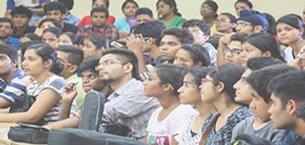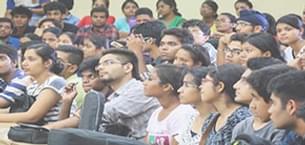Masters in Aerospace Engineering in Canada is offered across 5 universities as an MEng or MASc degree. This is both a full-time (3 years) and a part-time (6 years) degree program. The cost of pursuing a Master’s in Aerospace Engineering ranges between 15,000 USD to 47,000 USD annually, depending upon the choice of university. For an Indian student planning to study at engineering colleges in Canada, this cost goes up to 34 lakhs per year.
Wondering how to fund your education in Canada? You can look for scholarships to study in Canada.
Only those applicants can apply for the program who have a bachelor’s degree in either Aerospace Engineering or in a related field of study of either engineering or science or even mathematics. It is important for international applicants to have a four-year bachelor’s degree, IELTS score (6.5 to 7.5 to other equivalents), and LORs are required.
The course focuses on advanced concept building in aircraft and/or spacecraft designing and development. Students willing to pursue this course at a Canadian University can opt for anyone out of 15 popular specializations in the second year of study and pursue a career in the same. You can expect to make around an average of 50,000 USD a year after completing a masters in aerospace engineering in Canada.
Top Universities for Masters in Aerospace Engineering in Canada
There are a few universities that offer Masters in Aerospace Engineering in Canada. Some of these are ranked globally by QS University Rankings while the other Canadian Universities offering Masters in Aerospace Engineering are ranked nationally by Macleans. The following table throws light on the university rankings:
| University | Program | Annual Tuition Fees (INR) |
|---|---|---|
| University of Toronto | M.ASc Aerospace Science and Engineering | INR 39,73,599 |
| M.Eng Aerospace Science and Engineering | INR 39,73,599 | |
| McGill University | M.Eng Aerospace Engineering | INR 23,45,704 |
| Concordia University | M.Eng Aerospace Engineering | INR 18,19,141 |
| M.Eng Aerospace Engineering | INR 16,69,476 | |
| Ryerson University | M.ASc Aerospace Engineering | INR 16,69,476 |
| Carleton University | M.ASc Aerospace Engineering | INR 14,89,355 |
Masters in Aerospace Engineering are offered either as MEng- a non-thesis, course-based degree program or, as MASc- which is a thesis-based degree program. There are some dual degrees that are offered at Canadian Universities. Read the following section to know more about the courses and specializations offered.
Course Curriculum
The Masters in Aerospace Engineering offers different aspects of aircraft designing and building to students in Canada. A total of 45 credits is required along with a project or thesis submission at the end of the program to achieve a Masters's degree in Aerospace Engineering in Canada. The following table shows the mandatory courses that are taught on campus:
| Advanced Systems Control | Computational Dynamics |
| Optimization of Aerospace Design | Aerospace Thermal Engineering |
| Computational Methods in Aerodynamic Analysis | Spacecraft Dynamics & Control |
| Aircraft Certification | Aircraft Systems Integration |
Specializations Offered
More than 15 specializations are offered in Canadian Universities to students to choose from while pursuing Masters in Aerospace Engineering. Some of the popularly opted fields of specialization are Aeronautics, Propulsion & Combustion, Avionics & Control, Structures, Materials & Manufacturing, Space Engineering including- Dynamics, Sensor Processing and Rover Navigation and Aircraft Conceptual Design, Optimization & Design.
Masters in Aerospace Engineering V/S Aeronautical Engineering
Aeronautical and Astronautical Engineering are major fields of Aerospace Engineering. Other than this, the other areas where a distinction can be made, includes scope, specializations, job profiles, etc. The comparison between Masters in Aerospace Engineering and Aeronautical Engineering in Canada are tabulated below:
| Factors | Aerospace Engineering | Aeronautical Engineering |
|---|---|---|
| Basic Difference | Deals with designing and building aircraft and spacecraft. | This field deals with designing and building planes and helicopters. |
| Scope | Work with Pratt & Whitney, Bell Helicopter, CAE Electronics, etc. | Work with Boeing, Airbus, Bombardier Inc, etc. |
| Popular Specializations | Spacecraft Design, Introduction to Astronautics, Jet Propulsion, Spacecraft Dynamics, Orbital Mechanics, etc. |
Thermodynamics, Heat Transfer, Aircraft Structures, Flight Mechanics, Aircraft Stability & Control, etc. |
| Job Profiles | Aircraft/Spacecraft Designers, Consulting Engineer, Aerospace Technician, etc. | Aeronautical Engineer, Engineering Manager, etc. |
| Average Starting Salaries | 60,000 USD | 58,100 USD |
Why Study Masters in Aerospace Engineering in Canada?
Students passionate about aircraft and spacecraft designing and learning more about the technical aspects of the same may opt for this degree program. High demand for Aerospace Engineers will be seen within the next 10 years. Other reasons why an applicant can opt for a Masters in Aerospace Engineering in Canada are as follows:
- Students can design and develop the operating systems of aircraft, spacecraft, missiles, and satellites.
- Employment for postgraduates in Aerospace Engineering in Canada has surged to 6%.
- Aerospace Engineers can also be involved in the evaluation, installation, operation, and maintenance of the aircraft/spacecraft.
- In 2020, the median pay was 115,220 USD for Aerospace Engineers holding a master's degree in Canada.
Masters in Aerospace Engineering in Canada Cost
Between 15,000 USD to 47,000 USD is the one-year tuition fee required to study Masters in Aerospace Engineering in Canada for international students. This cost depends upon the university which includes one-time payments that are not required to be paid in the second year of study.
| University | Annual Tuition Fees (INR) | Annual Tuition Fees (CAD) |
|---|---|---|
| University of Toronto | INR 3,973,599 | CAD 65,366 |
| INR 3,973,599 | CAD 65,366 | |
| McGill University | INR 2,345,704 | CAD 38,587 |
| Concordia University | INR 1,819,141 | CAD 29,925 |
| INR 1,669,476 | CAD 27,463 | |
| Ryerson University | INR 1,669,476 | CAD 27,463 |
| Carleton University | INR 1,489,355 | CAD 24,500 |
The annual expenses include tuition fees (which excludes one-time payments in the second year), off-campus living expenses and cost to be incurred on books or other educational supplies while pursuing Masters in Aerospace Engineering in Canada. Following table shows the university wise costs in CAD, that are to be incurred on a yearly basis:
| Expense | Cost of Living in Canada in CAD | Cost of Living in Canada in INR |
|---|---|---|
| Books and Material (yearly) | Up to 1,665 CAD | Up to 1 lakh |
| Health Insurance (monthly) | 550- 915 CAD | 33,000 to 55,000 |
| Food (monthly) | 250 CAD | 15,000 |
| Transport (monthly) | 30- 65 CAD | 2,000-4,000 |
| Entertainment (monthly) | 135 CAD | 8,000 |
| Phone & Internet (monthly) | 30 CAD | 2,000 |
The admission process for Masters in Aerospace includes a set of eligibility criteria that must be fulfilled in order to get admission to the degree program in Canada. The section below throws light upon the requirements of international students.
Masters in Aerospace Engineering Eligibility
Applicants willing to apply for admission to Masters in Aerospace Engineering in Canada must have a 4 years bachelor's degree in Aerospace Engineering or in a related field of study, from a recognized university.
- 10+2+4 years of proof of education to be eligible for admission to Masters in Aerospace Engineering in Canada.
- The applicants must give proof against any criminal background.
- International students must have 2-3 years of professional experience or experience in research.
- A GPA of 3.0 or above must be scored by Aerospace Engineering graduates, for admission in Canada.
- GRE is required by the University of Toronto only for admission to MS in Aerospace Engineering.
Masters in Aerospace Engineering in Canada Admission Requirements
Merely fulfilling the requirements does not guarantee an applicant admission to the university they have applied to. Students can apply through the official website of the respective university. Other than Concordia University, they must apply through the OUAC Application Portal.
The following table shows the admission requirements along with English Language Proficiency scores like TOEFL or IELTS or PTE while applying for MS in Aerospace Engineering in Canada:
| University | GPA (score/grade) | Number of LORs Required | IELTS |
|---|---|---|---|
| Concordia University | - | 3 | 6.5 |
| University of Toronto | 3.3 | 2 | 7.5 |
| Ryerson University | 3.0 | 2 | 7.0 |
| Carleton University | B+ | 3 | 6.5 |
* Note: Transcripts, Statement of Purpose/Intent and Resume/CV are required by all the universities given in the table above, offering Masters in Aerospace Engineering in Canada.
Jobs in Canada for MS in Aerospace Engineering Postgraduates
The aerospace industry is known to contribute the maximum to the Canadian economy each year. This industry contributed about 25 billion USD in GDP alone in 2021. The median recorded salary for 2021 was close to 115,220 USD for an experienced aerospace engineer.
Students with a Masters in Aerospace Engineering in Canada can find themselves holding the following job profiles along with their annual salaries:
| Job Profiles | Annual Salaries (in CAD) |
|---|---|
| Aerospace Engineer | 76,777 |
| Consulting Engineer | 66,857 |
| Aircraft Engineer | 95,550 |
| Aerospace Technician | 58,500 |
Top 10 globally renowned companies that offer jobs to Aerospace Engineering postgraduates in Canada are mostly from Montreal. They hire postgraduates to fill vacancies for various posts like Consulting Engineers, Manufacturing Plant Managers, Executive Officers, etc. Some of these companies are as follows:
- Pratt & Whitney Canada
- Bell Helicopter
- CAE Electronics
- Bombardier Aerospace
Since Canada’s fleet of aircraft is on the verge of aging and currently violates environmental norms, they in-turn require replacement. Thus, it is projected that by the time new aerospace engineers would be recruited in the upcoming 10 years, there will be a shortage of both manpower and production of new aircraft.
Students willing to pursue a career in aerospace engineering can be benefitted from a huge number of vacancies, around 3,900 between 2017 to 2026, that will open up due to retirements, promotions, or if people move out. Also, the projected salaries could also go up from the current 60,000 USD to 90,000 USD. Hence, this can be a good option to choose for a prosperous future.
FAQs
Ques. Which is the best University for masters in aerospace engineering in Canada?
Ans. Some of the best universities for masters in aerospace engineering in Canada are University of Toronto, Carleton University, Concordia University, Ryerson University, etc.
Ques. Is aerospace engineering in demand in Canada?
Ans. There has been a surge of employement of aerospace engineers for past tenure. Employers are looking out for professionals with the skill-set and learning of the sector and specialization.
Ques. How much does masters in aerospace engineering in Canada cost?
Ans. Masters in aerospace engineering in Canada cost from 15,000 USD to 47,000 USD. For an Indian student, this goes to around 11-34 lakhs.
Ques. What is the eligibility for pursuing masters in aerospace engineering in Canada?
Ans. To get into masters in aerospace engineering in Canada is a GPA of around 3.0 on a scale of 4.0, GRE scores, and language proficiency scores.
Ques. How much can I earn after masters in aerospace engineering in Canada?
Ans. With a masters in aerospace engineering you can make around 50,000 to 60,000 USD on average.




















1578394125.png?tr=w-305,h-145,c-force?h=175&w=350&mode=stretch)



Comments